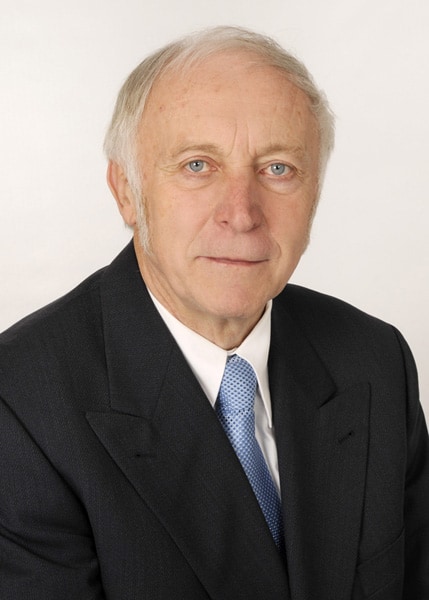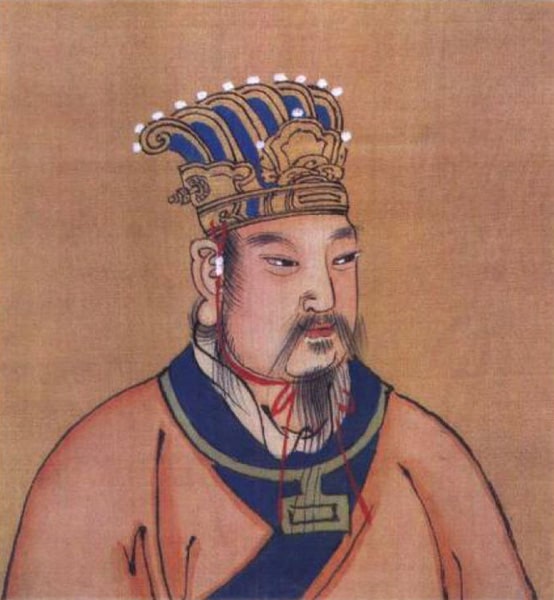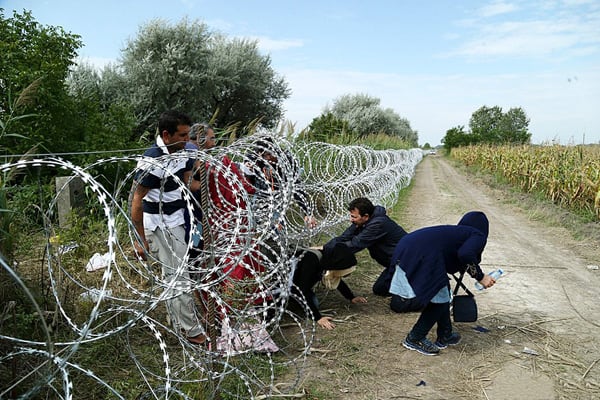IQ Studies Behind the Iron Curtain
Grégoire Canlorbe, American Renaissance, May 20, 2020

Volkmar Weiss is a German geneticist and historian. He graduated from Humboldt University of Berlin with a Doctor of Science degree in 1972, after presenting his dissertation on the heredity of giftedness. He has written several books on human genetics and social mobility. From 1990 to 2007, he was head of the German Central Office for Genealogy. In 2000, Dr. Weiss published Die IQ-Falle: Intelligenz, Sozialstruktur und Politik [The IQ Case: Intelligence, Social Structure, and Politics], which is commonly considered the German equivalent of The Bell Curve. A shorter version, in English, is called IQ Means Inequality: The Population Cycle that Drives Human History (KDP 2020).
In retirement, Dr. Weiss has written nonfiction books and alternative history novels, among them, in 2012, Die Intelligenz und ihre Feinde: Aufstieg und Niedergang der Industriegesellschaft [Intelligence and Its Enemies: The Rise and Decline of Industrial Society] and, in 2007, Das Reich Artam: Die alternative Geschichte 1941–2099 [The Artam Reich: The Alternative History 1941–2099]. In his 2010 book, Germany Abolishes Itself, Thilo Sarrazin used Dr. Weiss’s arguments to support his own conclusions on demographic substitution.

Volkmar Weiss
Grégoire Canlorbe: Against the consensus position, you argue that intellectual inequalities are mostly rooted in genes, and that they are correlated with social inequalities. How did you arrive at your views?
Volkmar Weiss: The Communists, who came to power in 1945 in the Soviet occupation zone of Germany, started from the assumption that all social differences were based on social causes. Orthodox communists believe that by abolishing these causes — first and foremost, differences in education — they can abolish social differences. Therefore a “counter-privilege educational policy” began in East Germany. Children whose parents belonged to the intelligentsia were discriminated against, while children of workers and peasants received special support — for example, in “workers and peasants faculties.” At the end of the 1950s, East Germany had managed to make considerable progress towards the goal of equal opportunities. What happened then?
Into the 1960s, many high school graduates whose parents had received special support after the war as children of workers and peasants had become managers or members of the intelligentsia. Because of this newly acquired social status, their children no longer counted as children of workers and peasants, and were thus no longer eligible for special treatment. This was embarrassing to the erstwhile representatives of the “vanguard working class,” and in the mid-’60s, the special promotion of workers’ children was abolished. In the meantime, there was already social research in East Germany that had discarded vague categories such as “working class,” and started establishing clearer classifications of the population. Researchers began to define all university and technical college graduates (approximately all those with an IQ above 115), regardless of their job, power, or function, as members of the intelligentsia.

“He votes SED.” (SED was the ruling Marxist-Leninist party in East Germany.)
Uniform school conditions have a homogenizing effect, but also a differentiating one: In very similar environments, differences in outcome become increasingly associated with genetic differences. In the 1960s, the East German elite therefore became interested in promoting talent, and no longer ruled out the possibility of a genetic basis for high IQ. In 1969, Professor Hans Grimm, director of the Institute of Anthropology in Berlin (East), asked me to do research on the inheritance of mathematical giftedness. I saw myself in the footsteps of Francis Galton. I agreed, and received permission for this research from Margot Honecker herself, minister of national education and wife of East German ruler Eric Honecker.
I used the annual “Olympiads of Young Mathematicians” held in East Germany as the starting point of my work. In the period 1963–1971, about 2.8 million students participated in these competitions, all mentally healthy students in grades 5–12. From the registration materials of the top 1,329 students, we had data on around 20,000 of their relatives.
These findings were particularly important:
- In families in which the father belonged to the top IQ/occupational group, all siblings of the participants in the math contest were far above average.
- In the families in which the father was not in the top IQ/occupational group, the siblings spread over the entire possible occupational spectrum. Approximately 14 percent of siblings were in jobs that generally did not require more than average mental ability.
- A particularly striking finding was found among the collaterals (the siblings of the parents of the highly gifted and their spouses), when both parents either belonged to the top IQ group or both were unskilled workers. They almost always had children working exclusively in their own qualification and IQ level. Couples in the middle IQ range of around 110, on the other hand, had children working in the entire spectrum of occupations.
These findings suggest the segregation of genes as the background for high IQ and giftedness.
Grégoire Canlorbe: What have been some of the approaches to finding the genes that correlate with intelligence?
Volkmar Weiss: Genes associated with IQ should have a predictable distribution within social strata, ethnic populations, and samples of high and low IQ subjects. In 2012, this was the starting point for looking into all databases of human genes then available. There were high hopes for a gene locus C2orf16 rs1919128, but it was a false positive. Likewise, many genes thought to be associated with schizophrenia, Alzheimer’s, and so on turned out to be false positives. It is now established that there is a large number of genes associated with intelligence, and each makes only a small contribution.
Another approach to finding genes associated with intelligence was to look for the greatest genetic differences between men and apes. Following this approach, a group led by Prof. James Sikela of the University of Colorado found out the number of copies of the gene DUF1220 (now known as the Olduvai domain) has the highest number of copies in humans, and is in decreasing numbers in great apes, Old World monkeys, rare in non-primate mammals, and absent in non-mammals. It is also highly correlated with IQ, but also with a risk of having autism or schizophrenia. High-IQ people have about 20 copies more than low-IQ people.
Grégoire Canlorbe: In your study of the biocultural mechanisms underlying the rise and fall of empires, you are indebted to German physician Eckart Knaul. Can you summarize his “biological law of mass action”?
Volkmar Weiss: Reading Knaul was for me a revelation. Spengler did not go beyond parables, but Knaul outlined a scientific chain of causes and effects leading to a turning point.
When land is broken up for the first time, plants settle on the fertile soil and quickly fill the entire space. Annuals are followed by perennials, and finally shrubs and trees. They grow denser and higher until the area is destroyed by a forest fire. Then the process begins again.
Among mammals, we find density-dependent regulation, which means a constant fluctuation of numbers. Any plague of mice or rats is followed by a collapse of their population. Among social mammals that usually live in a social hierarchy, collapse can be the result of a chain of events: Crowding and strong intra-species competition destroys the dominance hierarchy. A population with no established hierarchy becomes more and more chaotic as individuals fight each other. In an overcrowded cage of rhesus monkeys, we see murder; with rodents, we see apathy, sterility and cannibalism. We have seen similar outcomes among humans in overcrowded and underfed POW camps. Something like this was probably the fate not only of Easter Island but in other more complex societies of the past.
A society that can increase per capita wealth accelerates its own social change. Several times in the last 3,000 years, we have seen China rise and decline, and form powerful central states that disintegrated. Chinese historians speak of the dynastic cycle. A capable ruler founds a powerful dynasty. The empire is united. Its borders are secured, roads are built, the irrigation system is repaired, life becomes better, and the population increases. In later generations, there is a growing bureaucracy, higher taxes, cuts in public benefits, and decline sets in. Among the masses, the opinion spreads that the dynasty has lost “the mandate of heaven.” The dynasty is overthrown under chaotic circumstances, in which the population is again drastically reduced.

Chinese King Wen of Zhou, the first ruler to invoke the “mandate of heaven.”
According to Knaul, the rise in the number and density of a population always leads to overcrowding. This leads to constitutional changes such as universal suffrage and demands for socialism, but Nature eventually regulates population density. The full cycle requires the reorientation of women away from the normal pattern of reproduction and childrearing, which destroys the social order. In the West, this is called emancipation and feminism.
Grégoire Canlorbe: The creative and cognitive potential in Western industrialized countries appears to be declining as monarchy and warlike aristocracy gave way to bourgeois democracy and the establishment of a pro-immigration welfare state. How does this fit into the population cycle driving human history?
Volkmar Weiss: The history of the Greek city-states led Aristotle to conclude that the form of government depended on population size and the relative distribution of rich and poor — that is, on what we today call population density and social structure. He found a constant relationship between the greatness of a community on the one hand, and the relative shares in various occupations and social roles and the relative size of its elite on the other.
A consistent goal on the road to modernization is universal, free, and equal suffrage. It is the fundamental political demand of mass societies. In the 19th century in England, the view spread that universal suffrage as a prelude to a radical redistribution could solve all social problems.
In 1891, Prussia enacted its first progressive tax. Low-income earners with children were exempt. On this day, the breeding of stupidity began. In the entire history of mankind up to that point, the survival of children depended on the economic success of parents. If parents were incapable, they could not or would not marry; any children they might have had poor chances for survival. Democracy brought progressive taxation, the welfare state, and incentives for the have-nots to have children.
Couples limit the number of children if they fear their children cannot maintain the parents’ social status. Since entry into the upper classes is more limited than places into the lower classes, birth control begins in the upper class. It is a response to the fear that one’s children will lose in social competition. The ruling class started birth control in the last third of the 19th century, and the middle classes — salaried employees and skilled workers — started having fewer children after the turn of the century. The number of children in the upper and middle classes was limited in order to protect them from downward mobility. When this became apparent around 1900, Francis Galton predicted the drop in general IQ levels, which has since taken place.
Also, millions of foreigners with a mean IQ below 100 are pushing into Europe, and democracy seems to us like a warm late summer evening. We know this beautiful evening will be followed by cold and stormy days, from which we cannot escape.

Grégoire Canlorbe: Tell us about your novel Das Reich Artam, in which Hitler dies before war with the United States, and the Third Reich survives.
Volkmar Weiss: Das Reich Artam can be read and understood as a utopia or a dystopia, and parts even as prognosis or parody. Over the decades, both Franco’s Spain and Stalin’s Soviet Union developed very differently from their origins. Therefore, the deeper message of the novel Artam is not the survival of the Third Reich in Eastern Europe, but the role it could have played in the cycle of political constitutions. Adolf Hitler was a man against his times, but if his Reich had survived him, it would have changed, too. Such an outcome is not appealing to publishers, who do not like or understand the deeper message.
Grégoire Canlorbe: Do you think there are race differences in attitudes towards death?
Volkmar Weiss: I do not know, but the whole world seems to be stricken by irrational panic and fear of death.
Grégoire Canlorbe: Thank you for your time. Is there anything you would like to add?
Volkmar Weiss: If it had not been for the Christian Drosten group in Berlin that developed the test for Covid-19 and made it available to China in January 2020, there would not be a single statistic on the spread of the new virus. Not one. A somewhat puzzling flu-like epidemic would have spread around the world, as has happened a hundred times before. Each time, thousands, even millions of people — mostly old people — died, and were not treated separately in the mortality statistics the following years.
That could be the same this time; nothing more. What is taking place is an anxiety- and media-driven infection of common sense, which is no longer able to balance costs and risks. This inability to balance costs and risks is unchanged since the time of Adam and Eve.
Now, the enforcement of the human right to die in an intensive-care bed is our most important goal. Everything is subordinate to this. The problem is not a new virus, but the inability of mass society to deal with it.















